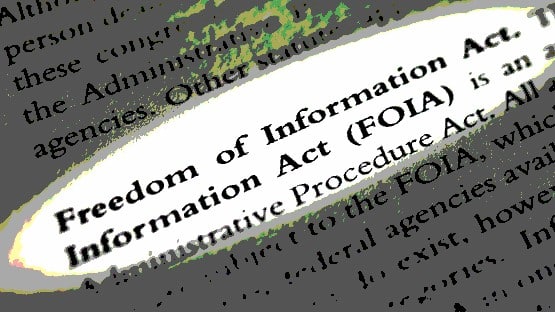
Our effort to get Augusta County to make public a recording of a March 20 closed meeting of the Board of Supervisors in which board members discussed the resignation of South River Supervisor Steven Morelli was back in court on Thursday.
Judge Thomas J. Wilson IV heard arguments in our case, Graham v. Augusta County, and a related case, Breaking Through Media v. Scott Seaton and Augusta County, in Augusta County Circuit Court.
At issue in both cases is access to a recording of the March 20 Board of Supervisors closed session made by Seaton, who was censured by the BOS in July after board members learned that he had been secretly recording meetings for the past two years.
Seaton, in August, invited members of the local media and local citizen watchdogs to file a FOIA request with him to request a digital copy of the recordings, before he voluntarily turned over copies of the recordings to the Board of Supervisors in response to an Aug. 2 BOS request.
I filed a request for a copy of the digital recording of the March 20 meeting on Aug. 4, and it was ultimately denied by the county on Aug. 21.
An Augusta County General District Court judge heard my appeal of the denial by the county on Sept. 5, and ruled in favor of the county on Oct. 12, declaring in his ruling that the recording is not subject to FOIA because it was made by Seaton for Seaton’s own purposes, and is therefore “not a record of the agency,” and that the Board of Supervisors had legally used a Virginia Freedom of Information Act exemption to go into closed session.
My contention, in response to those two points, is that, one, the recording made by Seaton is, in effect, a “public record,” according to state code section 2.2-3701, which states:
“’Public records’ means all writings and recordings that consist of letters, words, or numbers, or their equivalent, set down by handwriting, typewriting, printing, photostatting, photography, magnetic impulse, optical or magneto-optical form, mechanical or electronic recording, or other form of data compilation, however stored, and regardless of physical form or characteristics, prepared or owned by, or in the possession of a public body or its officers, employees, or agents in the transaction of public business.”
On the second point, about the legal use of the FOIA exemption, my contention is that the motion made by the Board of Supervisors to go into closed session on March 20 did not cite that board members would be discussing a matter involving “specific public officers’: it instead cited “specific employees.”
Morelli, who had resigned his seat before the meeting, was at the time of the meeting a former member of the Board of Supervisors, thus was not a “specific employee” at the time of the closed session; and even if he would have still been a member of the Board of Supervisors, a member of the Board of Supervisors is not, for the purpose of discussing the applicability of the FOIA statute, an “employee,” but rather, a “public officer.”
The county, in its defense, made the claim during Thursday’s hearing that Morelli didn’t actually resign until 1:12 p.m. on March 20, and County Administrator Tim Fitzgerald testified that, to his knowledge, members of the Board of Supervisors would not have been aware of the resignation at the time of the meeting, which was scheduled to begin at 1:30 p.m., that Morelli had stepped down.
Texts obtained through a FOIA request reveal that Morelli had actually reached out to two members of the Board of Supervisors the morning of March 20 to tell them that he had already resigned his seat on the Board.
“Gerald, it’s with a heavy heart that I resigned from the board today. Please give me a call when you get a minute,” Morelli wrote to Gerald Garber, who represents the Middle River District on the BOS, in a text message time-stamped at 11:08:30 a.m. on March 20.
“I just resigned from the board,” Morelli wrote to Jeffrey Slaven, the board’s vice chair, in a text message time-stamped at 11:10:18 a.m. on March 20.

“Are you done with the meeting?” Morelli asked Wells in that first text.
Wells responded at 5:48:28 p.m.
“Yep- missed you !! I love you man ! Call me anytime and I’ll stay in touch. You made the right decision- don’t look back !! ❤️”
Less than a minute later, at 5:49:12 p.m., Morelli got back to Wells.
“Thanks Butch I’m always here for you and Donna.”
Less than a minute later, at 5:50:03 p.m., Wells responded.
“Going out for a walk before my head explodes- I despise that woman!!!”
Seconds later, at 5:50:17 p.m., Morelli texted back: “Me too.”
The final message in the thread was from a heart emoji from Wells at 6:34:46 p.m.
At least two board members, then, were aware of Morelli’s resignation more than two hours before the scheduled start of the board meeting, and the text back-and-forth with Wells from after the meeting suggests that Wells had prior knowledge as well.
The matter involving Morelli, who stepped down reportedly under pressure in the face of sexual-harassment allegations, was hardly a secret. Whispers among those in county government circles had suggested before the March 20 date that Morelli was facing scrutiny from fellow board members, and under pressure from at least one board member to consider stepping down.
It is notable, with that as context, that the closed session that was held at the March 20 meeting was on the published agenda in the days leading up to the meeting.
Fitzgerald conceded in testimony on Thursday that “the Morelli situation” was a focus of discussion in the closed meeting, and Seaton, representing himself in the case brought by Breaking Through Media, tried to press Fitzgerald on what would seem to be a significant point – alleging that Fitzgerald had left the closed meeting briefly to discuss the “Morelli situation” with someone who wasn’t in attendance before returning.
The county’s attorney, Rosalie Pemberton Fessier, objected to a question from Seaton to Fitzgerald on that point, saying an answer from Fitzgerald could lead to a revelation about the nature of the meeting, and Wilson sustained her objection, so Fitzgerald didn’t have to answer, but the point was made.
If Fitzgerald did leave the closed meeting to discuss it with someone who was not a part of the meeting, the confidentiality sought by board members was breached months before the FOIA requests were made by me and by Breaking Through Media.
Status update
If you’ve read this far, you’re wondering – what’s next with this case?
That’s where we are; no, we don’t know, either.
The county asked for seven days to be able to file a legal brief addressing the impact of the text messages between Morelli, Garber, Slaven and Wells on the timeline of the events of March 20, and Wilson agreed to a Dec. 28 deadline for that.
That’s all we know at this point in terms of the dispensation of the case from here.










